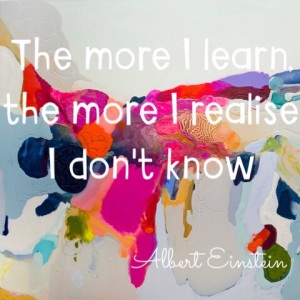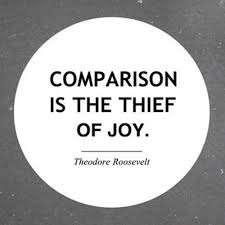I’ve spent the last two days while I am on leave catchng up on some long overdue reading and learning. It’s a totally luxury and feels like bliss – my biggest take out is to be far more proactive in my approach to ensuring I have regular learning days set aside in my schedule. This quote by Albert Einstein sums up my feelings perfectly:
The Grass is Greener Where You Water It
Edited excerpt from the City of Unley Community Team Newsletter (January 2015)
How good is this quote! I love it and so am sharing it with you, mainly as it serves as a great reminder that with care and effort, almost every situation can be turned into something productive and rewarding.
No doubt, we are all guilty at times at proverbially “looking over the fence”: comparing what others have, other roles, situations, etc to our own lot and thinking we want that too or how much easier/better/etc life would be from another’s perspective.
This is all very normal and commonly referred to as “Grass is Greener Syndrome” – the idea that there is something better elsewhere that we may be missing out on. This restlessness could be regarding career, relationship, financial security, material wealth, travel, etc.
Of course, I’m not talking about settling, not following your dreams and passions or continuing to do something you don’t find fulfilling, I’m the last person who would suggest that! Instead I am talking about those little niggles we may occasionally have which possibly cause us to feel unsettled and disheartened.
Unfortunately, the Grass is Greener Syndrome is one big, juicy myth. More often than not, this kind of thinking is based on illusion, and it’s easy to be blinded by the possibility of escape, hope and the shiny promise of what if, rather than appreciating what we have and understanding the full picture. People can often make themselves down right miserable by externalising happiness and focusing on what they don’t have and what is annoying them about their current situation, convincing themselves that life would be better somewhere else or with someone else, etc. If only….
Generally speaking, similar challenges exist and are repeated in most situations. For example, from a work perspective most organisations have their fair share of red tape, hoop leaping, cranky people, passionate/political community members and so on. Yes, things may be different (or not), and something may even be better, but they may not too. Similarly, someone might get the opportunity to travel more than we do, but we don’t see the hours they work and the time they miss out on with their families.
There are a few tried and tested tricks you can experiment with to overcome this, including:
- Practising Mindfulness by focusing in on what’s happening right now. I love the John Lennon quote “Life is what happens to you while you’re busy making other plans”. Mindfulness is about being content no matter where you are in the world, or what you are doing, or who you are with and helps to appreciate life as it happens – bringing us back to the present moment.
- Practising Gratitude can put situations into perspective and reminds us what we have. This can lessen our need for wanting more and can provide a more balanced appreciation of a situation and a good way to work through hardship and challenge. There is SO much research on the benefits of gratitude, its effect on improving resilience, happiness and wellbeing, that the evidence is overwhelming. Some people do this by keeping a gratitude journal, others recognise and acknowledge when good things happen in the moment. Whatever works for you is the best way to go about it.
- Take Responsibility for how you feel, think and behave and your role in the situation. Ask yourself if there is anything you can do to improve your current circumstances or overcome the issue. I am a big believer in the saying “If you are not prepared to be part of the solution, then you forfeit your right to complain”. This is not always easy, but it depends how much you care about the problem – if it’s really an issue for you, do something to change it.
- Resist Comparing your circumstances to others. You don’t know (and may never know) what another person has put on the line to be where they are or what they have been through. Comparing your insides, to other’s outsides is always incredibly dangerous and misleading. The worst bit about it is we devalue ourselves in the process and spend too much time and energy worrying and trying to prove ourselves. This can result in competitive behaviours as well as feelings of resentment, dissatisfaction and loss of self-worth. Time and energy is much better spent in realising just how good we have it and working with the strengths we have.
I’m sure there are numerous other solutions that can be applied here. Just remember: Happiness is a state of mind and unless you take the time to care for and water the proverbial grass where you stand right now, it cannot and will not be the lush and green lawn you seek. Go for it!
Ode to Can
Edited excerpt from the City of Unley Community Team Newsletter (November 2014)
On a similar note to ‘COMPUTER SAYS YES‘ I wanted to share a bit of advertising magic with a commercial run by the Commonwealth Bank. The poem was created by M&C Saatchi creative director, Andy Fleming and featuring the brilliant Australian actor, Toni Collette. Toni recited a poem called: Ode to Can that captures the Can Do attitude perfectly. Hope you find it inspiring too.
Ode to Can
There’s a four letter word
As offensive as any
It holds back the few
Puts a stop to the many.
You can’t climb that mountain
You can’t cross the sea
You can’t become anything you want to be.
He can’t hit a century
They can’t find a cure.
She can’t think about leaving or searching for more.
Because Can’t is a word
With a habit of stopping
The ebb and the flow of ideas
It keeps dropping itself where we know in our hearts it’s not needed
And saying “don’t go” when we could have succeeded.
But those four little letters
That end with a T
They can change in an instant when shortened to three.
We can take off the T
We can do it today
We can move forward not back
We can find our own way
We can build we can run
We can follow the sun
We can push we can pull
We can say I’m someone
Who refuses to believe
That life can’t be better
With the removal of one insignificant letter.
Computer Says YES!
Edited excerpt from the City of Unley Community Team Newsletter (November 2014)
Anyone that’s seen the TV show Very Little Britain will remember one of their most popular skits, featuring banking consultant/travel agent Carol Beer. When approached with a reasonable request from a customer, Carol promptly punches information in her computer, turns back to the customer and replies with a dry, bored “Computer Says No”.
While it is totally hilarious, it is also rather scary when you think how much this parallels real life. Unfortunately it’s also a common perception that people have of Local Government – we hear it all the time: too much bureaucracy, red tape, and risk aversion – aka Computer Says No.
I’m sure all of us can relate to this: when you have been exploring a fabulous idea, looking for a solution to a problem or requesting assistance: only to be told no, without any logical rationale. From personal experience I regularly hear a whole variety of justification why NOT to do something, including “this is the way we’ve always done it”, “we’ve tried it before and it didn’t work”, “the system won’t let me do it”, “it’s too risky”, “what if such and such a person doesn’t like it”, “it’s not my problem”, “the form hasn’t been completed”, and so on. The problem is that, when faced with Computer Says No, most of us either just give up or accept it – it’s simply too hard. And, it’s the same for our community too. Simply speaking, it’s just not good customer service, nor does it support a positive organisational culture.
So why mention it? It’s because change starts with us. I want us to choose our attitude and adjust our own thinking: working to turn the no’s into YES!
Before you get too excited, I’m not talking about throwing caution to the wind, throwing the baby out with the bathwater and demanding wholesale change. Naturally there are some sound reasons why ‘no’ exists at times, ranging from legislative compliance and corporate consistency to cost restrictions and resource implications.
Instead, I am encouraging you to think about the obstacles and barriers facing you in undertaking your role, especially in providing excellent customer service and being as efficient and effective as you can be and consider a different approach of getting to yes.
Tips For When “Computer Say No” Happens To You
The best place to start is to define the problem that you are trying to solve (if you haven’t already of course), gather your facts on the topic (ie cost, budget, resourcing, community sentiment/expectations, etc) – everything you need to know before you move forward.
Then be clear about your intentions and what you are prepared to do to be a part of the solution. It’s then time to have a conversation with those who can help you get to yes. This preparation all comes in handy to clearly build a case for change – it’s a fact that people don’t know what they don’t know, so clearly stating your rationale is a good place to start.
From there, perseverance is key: be open to consider new information which may change your thinking and/or approach, be willing to explore the options, understand the consequences, broker in support from those you report to advocate and influence the decision, and accept that change generally takes time and rarely happens overnight. And again, because it is so important – persevere.
Also, sometimes these things can get personal, so the tip to avoid/overcome this is to remember focus on the problem not the person and seek to understand what the core issues are, using a good blend of empathy, mixed with eyes on the prize.
With this constructive approach, you’ll find that what starts as a firm no, can end up as a win/win and has the added a bonus of building trust and understanding.
Tips When It’s Your Computer Saying No
I also want you to think about the service you offer and when you are in No mode. This takes practice, especially to catch yourself doing it, as our response is often a reaction.
When faced with this, some questions you might wish to ask yourself are:
- Is it really a no and why?
- Have I taken the time to understand the problem from the other person’s perspective?
- Are there negotiables and non negotiables and why?
- What are risks of saying yes and can they be mitigated?
- Are there risks of saying no, including opportunity costs I need to consider?
- Is there a work around or another way? Are there alternatives available to reach a smart solution?
- Can I explain my no response with clear, non-emotive logic and rationale?
- What would it take to get from no to yes?
- What am I doing to prevent this and why? Can I do something differently to find a solution or make this happen?
There are so many more and these are just a start, and they demonstrate to the other person, be it an internal or external customer that you have respectfully thought through the problem.
Also, my hottest of hot tips is to become a black belt of the can-do attitude. This is not so much about a straight out yes, but mastering “Yes But…” It’s a willingness to work backwards from the solution/outcome, finding ways to overcome the obstacles. For example: your manager may have a brilliant idea, but there is no budget. Instead of a no response, I’d prefer to say: Yes – let’s explore this together, noting we may need to look at what should stop to let it start or agree to consider it the following year if it is still seen as important. My service promise is a willingness to listen, consider and find out more before proceeding and go from there.
Lastly, I was enthralled to hear that another local council had recently started an internal “Red Tape Register”, where staff could provide comment on areas of perceived inefficiency for review by the CEO’s office. The originator is notified either way of the outcomes; either of changes made or reasons why it exists and even be involved in the solution. AWESOME!!!
I hope you found some inspiration in this article and feel ready to give Computer Says Yes a go. It takes practice, especially if saying or accepting no is a habit, but you will be amply rewarded for your efforts through a sense of satisfaction, the rush that innovation and achievement brings and the strengthening of relationships with your colleagues. Remember everyone can always find reasons why you can’t do something or why it won’t work, but it’s far more rewarding to think of what you can do.
There’s An App for That
And from the place where all things are wonderful and make perfect sense – here’s Sesame Street’s view of Top Tech Trends
Top Tech Trends feat Randy Zuckerberg
Edited excerpt from the City of Unley Community Team Newsletter (August 2014)
What seems like eons ago I was fortunate enough to attend an early morning breakfast hosted by Business Chicks to hear the effervescent Randi Zuckerberg share her insights into the latest and greatest learning of the digital and social media world.
The name Zuckerberg of course has worldwide notoriety, the most famous Zuckerberg being Mark, social media giant and founder of Facebook. Well, his sister is as equally talented in her own right, being the former Marketing Director and spokesperson for Facebook, then running her own media firm Zuckerberg media, which she represented clients such as Clinton Global, Cirque du Soliel, the United Nations and travel mag, Condé Nast. Now Randi heads up Dot Complicated, a digital lifestyle website (and author of book of the same name), which is hot on the heels of the latest digital trends that will potentially reshape life as we know it.
And because the digital space is becoming increasingly a key part of our communications and service provision, and imposing itself on our personal lives too, I thought you may be interested in these emerging trends and get a kick out of them also. Enjoy…
The rise of the entre-ployee
Many young people want to be entrepreneurs, and employees are catering to this to retain top talent. Randi talked about companies like Google allowing employees to spend 20% of their time on their own projects, and how other businesses are setting up start-up labs for employees. There’s also a rising interest in all-night hack-a-thons where employees brainstorm ideas and find solutions to problems. The learning here is that good ideas and sustainable solutions can come from anyone in the business, and those closest to the business are likely to have the answer
Every single one of us is a media company
All businesses, big and small, need to think like a media company: Randi stresses the importance of building staff digital literacy and competency and educating and engaging with your customer through social medi
Connections are currency
Those of us with a high level of “klout” (aka social media influence and following) may now be able to stay in a hotel for free, attract significant discounts and receive VIP perks just because of our following. Some restaurants are even waiving the bill if you’ve showed them you’ve uploaded a photo of your meal and tagged them on social media. Fashion icon Marc Jacobs launched a pop up shop and you could buy his clothes based on social credit. Popular now pays…
Reinventing retail
Retail is no longer about walking in and out of shops. People are buying shoes on their phones or tablet; one jeans retailer allows shoppers to scan the QR code on a pair of jeans they like, and then a robot (yes an ACTUAL robot) brings out the jeans for them to try on. She also pointed to pop-up shops and vending machines that sell Chanel handbags, accessories and sunglasses. The banking industry is taking this up big time – transitioning from a card based service model to virtual: providing services via apps and mobile devices.
FOMO becomes JOMO
Forget the fear of missing out, where you scroll through social media and see how exciting everyone else’s lives seems to be – Randi says it’s now all about thejoy of missing out. We’re now seeing the creating of apps such as Anti-Social which actually blocks social-media networks for a period of time.
The Maker Movement
3D printing is on the rise – you can now print pancakes, makeup and houses. Within the next 12 months, we’re likely to be printing functional body parts, providing endless possibilities in the healthcare industry. Sadly 3D printed weaponry is also on the rise – had me thinking that all of these amazing innovations often come with complications.
Life logging
We’re becoming huge loggers and constantly documenting our lives, whether it be for health and fitness or work activities, and there’s no sign of it slowing down. There’s apps to track children and pets, “Narative” or ‘Lulu Guiness” handbags which automatically takes a photo record every 15 – 30 minutes, nail polish that sparkles when you are near a free wifi network, and even an app (Tikker) that counts down the minutes left in your life (ps – no thank you).
The new frontier of education and healthcare
With huge advances in technology we’re sure to see advances in education and health, and uni lectures could soon be a thing of the past. We will do more and more courses online, and education and up-skilling is becoming accessible to everyone. Take up of platforms like YouTube and skills share make it easy learn online and go from zero to hero on anything from brain surgery to loom banding. Drs online – allows you to have your medical consultations over the internet – online platform coupled with apps (such as stethoscopes, pulse checks) sends information to the Dr to read results and diagnose.
Gamification for motivation
Apps are making a game out of motivating us. Some hilarious examples are an alarm clock that donates money to charity when you hit snooze; Zombies Run app that makes you run faster because zombies are chasing you; and GymShamer shames you on social media for missing your gym session.
Unplug to refresh
Five years ago, no one would actually pay to go to a health retreat without Wi-Fi – but as digital devices increasingly choke up our days, more people are looking to ‘digital detox retreats’ to reboot their lives.
Bring Your 50
Edited excerpt from the City of Unley Community Team Newsletter (August 2014)
(credit for the original idea goes to Rachel Cooper, aka wise and ever witty GM at the time)
What seems like an eternity ago, my wise and ever witty GM at the time shared with me an absolute pearler of a concept – it’s one I think of and use daily: Bring Your Fifty.
The concept is in 3 parts. Firstly Bring Your 50 is about the nature of healthy sustainable adult relationships – be it personal like partner to partner, sibling to sibling, friend to friend, or professional as colleague to colleague, employer to employee, customer to service provider (and all visa versa). Bring Your 50 also helps prompts our thinking about when to stop investing in a person or situation and knowing when to let it go. Lastly Bring Your 50 is about showing up, stepping up and taking personal responsibility for a brighter future.
Bear with me on this while I explain further. Let’s think about our adult relationships and, for the purposes of this exercise say all relationships have round a value of 100. For these relationships to work effectively, or even at all, it requires both parties to be present commit and invest equally and mutually. Each person needs to independently want that relationship to thrive and succeed. Both need to contribute and be willing and ready do their bit to make it work – which could otherwise be put as requiring both people need to bring their 50.
Relationships tend to sour quickly when there is an imbalance. If one person is consistently carrying or covering for the other ie a continued 70:30 or worse 90:10 split – it gets old fast and it’s not long before a rift appears and things go downhill. Of course there are times in relationships we all do more to support our mates in need, however as a general rule, this cannot be sustained long term.
There are things here I’m sure you can relate to: such as the perception that someone we know or work with may not “do their fair share”; doesn’t take responsibility for their own growth; fault finds and points out problems rather than being a part of the solution. Or it could be someone we know that we endeavour to build a relationship with, only to be shut out or shut down.
So how can we use Bring Your 50 to help us? It’s about:
- Personal authenticity – being who you are, being true to your word, meaning what you say and saying what you mean, matching your audio with your video (talk AND action), being true to your values.
- Being part of the solution or understanding that if you don’t, you forfeit your right to complain (ref Proteus),
- A commitment to showing up, speaking up, being open, getting curious, listening to and considering other points of view, taking the initiative to find out more before criticizing and allocating blame.
- Taking responsibility and owning it: for your actions, your mistakes (which are opportunities to learn), your behaviour and your own growth and development, and your success.
- Willingness and courage to coach and support others to do their part, to step up, be a part of the solution and be all they can be.
- Responding rather than reacting, thinking things through, considering alternatives and options, choosing your attitude and mood.
- Personally investing and doing what it takes to make things better, not just pointing out what’s wrong, but actually doing something about it.
- Consciously choosing to invest your precious time and energy into relationships and tasks that matter – letting go of toxic relationships that may suck your energy, suffocate you with drama, drag you down rather than build you up – if others aren’t prepared to bring their 50, then why would you invest more?
- Understanding that things won’t change or get better unless you are willing to do the work and invest to make it so.
I encourage you to spend time to reflect about how you Bring Your 50. This could be about achieving a target, delivering a project, taking responsibility in sourcing your own development opportunities, sharing ideas and solutions to problems, and being an active, engaged member of your work or other team.
And remember that famous empowerment saying: “If it’s going to be, it’s up to me”.
Mea Culpa
Dear blog
I am so very sorry for ignoring you for so long. I have been really busy and there’s so much to tell you. I’ve been on a great adventure, I’ve met some awesome people and I’ve learnt a great many things. No doubt I am a different person because of these great experiences.
For now, I will share with you some articles I have included in my newsletter to my wonderful team at the City of Unley (not all the articles, rather those that are more generally useful). These stories are rich in learning and from the heart. I hope this helps ease your feelings of neglect and reassures you that we are never really that far apart.
Love your slacker blogger
Meg
In our garden today….
I totally love gardening and we have a small vegie patch (in the form of 4 raised beds) at the back of our garden. It’s a total mish mash of all sorts of unstructured things (a bit like me really) – edibles including fruit, herbs and vegetables and “my pretties”, lots of flowers planted to attract bees and other handy helpers, and some art that Miss 6 carefully selects (based on level of randomness we think) and constantly moves about the place.
Our poor garden has been somewhat neglected this season (too busy to plant sunflowers (!!!)) and, in thanks for its patience and ongoing bounty, will get a good, overdue dose of organic fertiliser this evening, preparing the soil for next seasons plantings.
Anyway, on such a lovely summer’s morning I wanted to share my little bliss with you all. Enjoy x
Meg
Happy New Year
Image via Behance: Sabeena Karnik – Typography design made from strips of coloured paper.
Wishing you all a very successful and happy 2013.
Meg
















